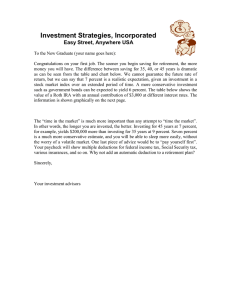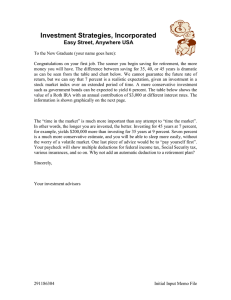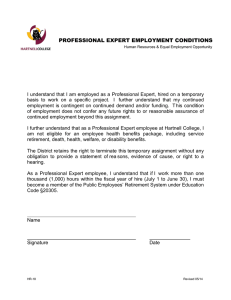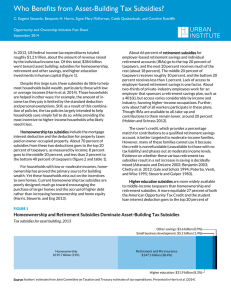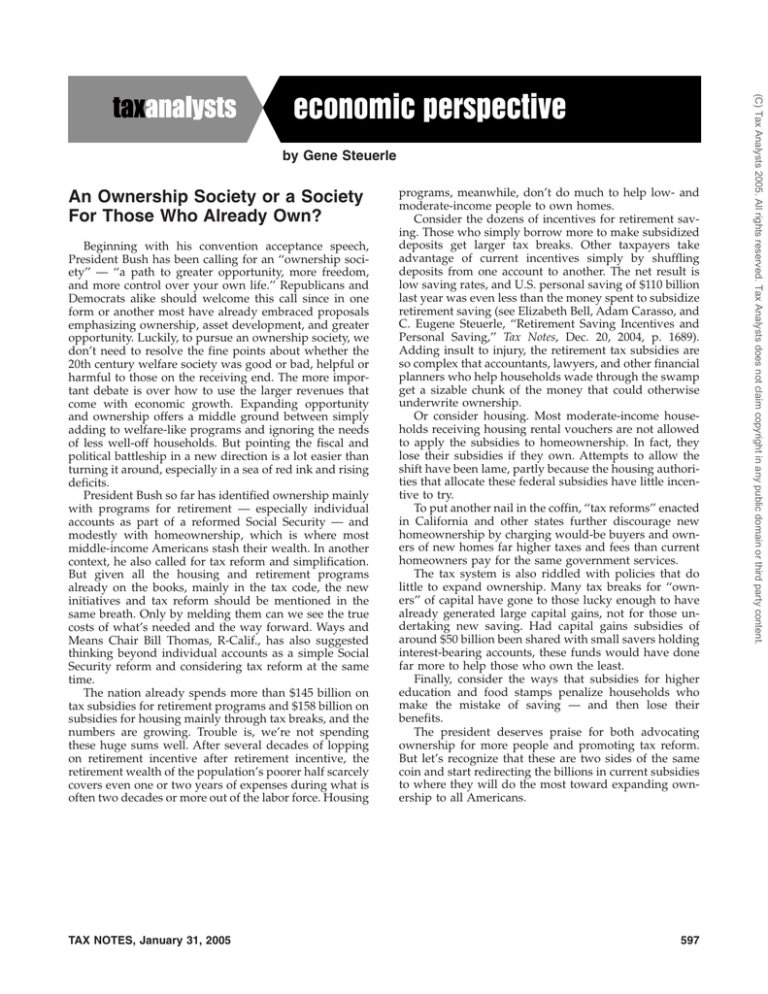
An Ownership Society or a Society
For Those Who Already Own?
Beginning with his convention acceptance speech,
President Bush has been calling for an ‘‘ownership society’’ — ‘‘a path to greater opportunity, more freedom,
and more control over your own life.’’ Republicans and
Democrats alike should welcome this call since in one
form or another most have already embraced proposals
emphasizing ownership, asset development, and greater
opportunity. Luckily, to pursue an ownership society, we
don’t need to resolve the fine points about whether the
20th century welfare society was good or bad, helpful or
harmful to those on the receiving end. The more important debate is over how to use the larger revenues that
come with economic growth. Expanding opportunity
and ownership offers a middle ground between simply
adding to welfare-like programs and ignoring the needs
of less well-off households. But pointing the fiscal and
political battleship in a new direction is a lot easier than
turning it around, especially in a sea of red ink and rising
deficits.
President Bush so far has identified ownership mainly
with programs for retirement — especially individual
accounts as part of a reformed Social Security — and
modestly with homeownership, which is where most
middle-income Americans stash their wealth. In another
context, he also called for tax reform and simplification.
But given all the housing and retirement programs
already on the books, mainly in the tax code, the new
initiatives and tax reform should be mentioned in the
same breath. Only by melding them can we see the true
costs of what’s needed and the way forward. Ways and
Means Chair Bill Thomas, R-Calif., has also suggested
thinking beyond individual accounts as a simple Social
Security reform and considering tax reform at the same
time.
The nation already spends more than $145 billion on
tax subsidies for retirement programs and $158 billion on
subsidies for housing mainly through tax breaks, and the
numbers are growing. Trouble is, we’re not spending
these huge sums well. After several decades of lopping
on retirement incentive after retirement incentive, the
retirement wealth of the population’s poorer half scarcely
covers even one or two years of expenses during what is
often two decades or more out of the labor force. Housing
TAX NOTES, January 31, 2005
programs, meanwhile, don’t do much to help low- and
moderate-income people to own homes.
Consider the dozens of incentives for retirement saving. Those who simply borrow more to make subsidized
deposits get larger tax breaks. Other taxpayers take
advantage of current incentives simply by shuffling
deposits from one account to another. The net result is
low saving rates, and U.S. personal saving of $110 billion
last year was even less than the money spent to subsidize
retirement saving (see Elizabeth Bell, Adam Carasso, and
C. Eugene Steuerle, ‘‘Retirement Saving Incentives and
Personal Saving,’’ Tax Notes, Dec. 20, 2004, p. 1689).
Adding insult to injury, the retirement tax subsidies are
so complex that accountants, lawyers, and other financial
planners who help households wade through the swamp
get a sizable chunk of the money that could otherwise
underwrite ownership.
Or consider housing. Most moderate-income households receiving housing rental vouchers are not allowed
to apply the subsidies to homeownership. In fact, they
lose their subsidies if they own. Attempts to allow the
shift have been lame, partly because the housing authorities that allocate these federal subsidies have little incentive to try.
To put another nail in the coffin, ‘‘tax reforms’’ enacted
in California and other states further discourage new
homeownership by charging would-be buyers and owners of new homes far higher taxes and fees than current
homeowners pay for the same government services.
The tax system is also riddled with policies that do
little to expand ownership. Many tax breaks for ‘‘owners’’ of capital have gone to those lucky enough to have
already generated large capital gains, not for those undertaking new saving. Had capital gains subsidies of
around $50 billion been shared with small savers holding
interest-bearing accounts, these funds would have done
far more to help those who own the least.
Finally, consider the ways that subsidies for higher
education and food stamps penalize households who
make the mistake of saving — and then lose their
benefits.
The president deserves praise for both advocating
ownership for more people and promoting tax reform.
But let’s recognize that these are two sides of the same
coin and start redirecting the billions in current subsidies
to where they will do the most toward expanding ownership to all Americans.
597
(C) Tax Analysts 2005. All rights reserved. Tax Analysts does not claim copyright in any public domain or third party content.
by Gene Steuerle

